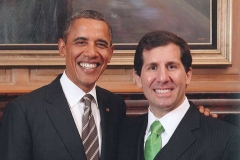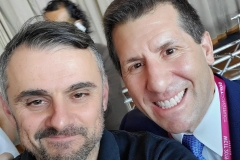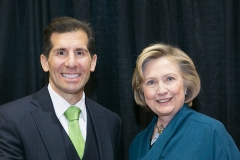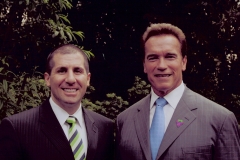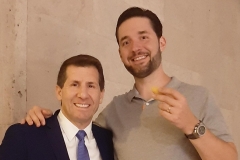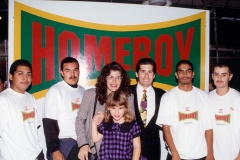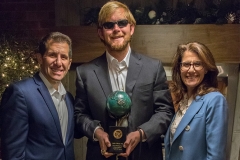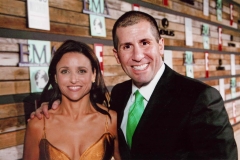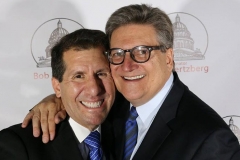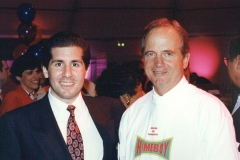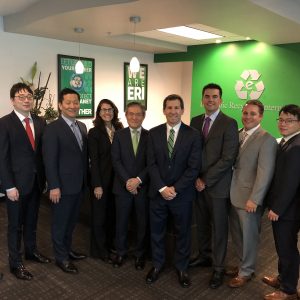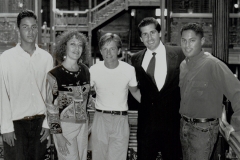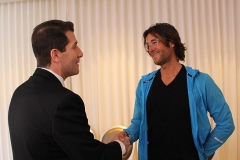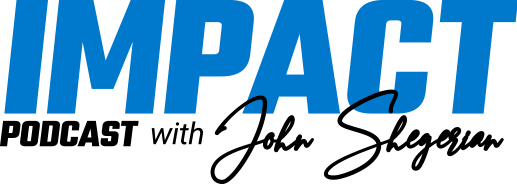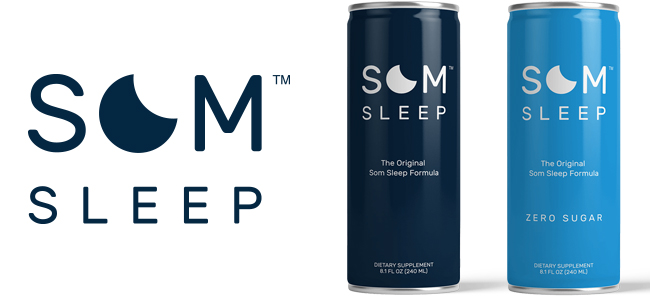
NIL ZACHARIAS: Thanks so much for your interest in this podcast and building a better food system. Before we get into the episode I wanted to tell you about the Eat For The Planet book. I wrote this fast paced book with the goal of making a compelling case for why we urgently need to change the way we eat and our food system. The book explains the impact of industrial farming on the environment and it’s backed with scientific research and statistics but is delivered in a format that is incredibly easy to digest. I hope you buy the book and help spread the word by leaving an Amazon review and posting about it on social media using the hashtag #EatForThePlanet. Go to www.EFTP.co. That’s www.EFTP.co to find out more and get the Eat For The Planet book today.
I’m Nil Zacharias and you’re listening to Eat For The Planet. On this show we try to answer the question how can we eat in a way that nourishes us without starving the planet? The show features conversations with food industry leaders, health and sustainability experts, as well as entrepreneurs and creative minds who are redefining the future of food.
Sleep. It’s something we all need to lead healthy productive lives. But like most other things we know we need to do to stay healthy sleep is often neglected, and not in the same careless manner that we neglect to eat three servings of vegetables a day. We purposefully ignore sleep and even brag about how little sleep we need to prove that we can work hard, play harder, or even watch TV harder than everyone around us because, for some reason, we’ve come to think of sleep as a waste of time.
This is the exact sort of mindset that serial entrepreneur John Shegerian is trying to disrupt. As the founder of over eight businesses John knows a thing or two about burning the candle at both ends. But after he experienced what doctors call a “micro sleep event” where he passed out for a few seconds from exhaustion he realized he needed to make a change. In this conversation John and I discuss what led him to found Som Sleep, a company that makes an all natural, vegan, non GMO, allergen free, non habit forming beverage that is formulated to help individual achieve better sleep. He talks about how he went from making his own sleep formula at home to teaming up with food scientists and later co-packers and distributors to help make this company a reality.
John shared some statistics related to micro sleep events and the average American that will, frankly, shock you. He also addresses some of the reasons why we have such a hard time falling asleep and staying asleep and speaks to how the ingredients in Som are designed to naturally restore your body’s ability to sleep restfully.
Beyond the health accolades that Som has we get in to the business side of the company, discussing the current competition and how he plans to grow and expand in the future. The market for sleep aids, supplements, and related products is rapidly growing, but it is unfortunately dominated by pharmaceuticals at the moment. We spent a lot of time talking about how we can build a healthier, more sustainable food system on this podcast, but realistically we can’t even get to that point if we don’t stop to consider our own well being.
What I like best about this interview is that it shows that you don’t have to run yourself completely into the ground to be successful in the business world. In fact, if we all just got some sleep not only would we be more healthy but in the end much much more productive.
John Shegerian, thank you for joining us on the Eat For The Planet podcast.
JOHN SHEGERIAN: It’s an honor to be here Nil. Thank you so much. This is the best.
NIL ZACHARIAS: John, so you know we’ve known each other for a few years now and every time we catch up it’s usually over a meal, so, sorry, this is the first time we are chatting where there is no food involved – at least right now.
JOHN SHEGERIAN: There will be in the future though I know, so I’m not worried about the us missing another meal. We’ll get one together.
NIL ZACHARIAS: Yeah. So we initially connected based on – you were an entrepreneur. I think you interviewed me on the show you used to have.
JOHN SHEGERIAN: I did. Green Is Good.
NIL ZACHARIAS: And that’s how we go to know each other and met up in restaurants either in LA or in New York over plant based food talking about how this industry is growing and emerging and is going to be the only hope we have to change our food system. So I know our mutual – the things that we like are so similar because we shared a passion for food, we share a passion for business, for business that makes a social impact.
When I heard you were now getting into the food space through this new beverage that you have out I think the moment you told me about that I was like we have to sit down and chat about it and chat about how you came into this, what it is all about, and what it means for the health of the planet, the health of the people on the planet, and in what way is it connected to your bigger mission around food and health. So we’re going to get into all that today.
But I want to start off with sort of, since we mentioned food, how did you first get interested in food and health to begin with. I know that journey is what’s led you to Som now so we’ll start there.
JOHN SHEGERIAN: I was 17 years old and I was racing horses for a living. I was a harness driver and I wanted to get down to a certain weight. I had just spent my first year in college up in Boston University gaining weight in the freshman dormitory.
I picked up book at a Boston bookstore. I picked up Michio Kushi’s seminal book on macrobiotics and I just read it and reread it and said “this is a better way.” I literally changed my diet to macro biotics when I was 17 years old and went from probably a high of 213 pounds literally in 5 months to 145 pounds. My whole system from top to bottom changed about how I approach food and how I consume food and I was forever changed from that moment on.
NIL ZACHARIAS: Wow. So you sort of – your journey into it was because of weight loss and health and so that started off microbiotics, which is tough to keep up. It’s pretty – are you still macrobiotic or are you largely just plant based?
JOHN SHEGERIAN: Largely plant based now but when I’m in town here in New York City I’ll still always go back to Souen at 6th and Prince just to remind myself of the original feeling of eating miso soup and having brown rice and hijiki seaweed and just all the wonderful products that are available to us that are natural and really healthy for us and just make you feel the best that you can be.
NIL ZACHARIAS: Right. That’s so true. So you’ve been an entrepreneur. You’ve done a few different things. I know you’ve had a passion for doing businesses that have a social impact and you’ve done that right from HomeBoy Industries leading up to Electronic Recyclers and you’ve got a bunch of other businesses that I probably don’t even know about. How do you pick your projects that you get involved in? You could literally be doing anything you want actually with your life.
JOHN SHEGERIAN: That’s true. When you’re a serial entrepreneur you look at the world as you travel through your day and the greater journey that you’re on as a world full of voids. Then when you start sort of straddling the voids and trying to figure out which ones need to be done that’s one list. Then you figure out which ones need to be done by you by thinking about which ones you have a personal attachment to.
So when it came to HomeBoy I was living in LA at the time and we had some vacancies due to the Rodney King riots in our marketplace. In fact we had a tortilleria. And I saw Father Greg Boyle on 60 Minutes and I literally cold called him. We had no cell phones back then. I called him on a landline and I said “come have coffee with me” and we had coffee literally four feet away from this empty tortilla stall and we together invented the HomeBoy tortilla concept which was the first of many HomeBoy businesses that led to HomeBoy Industries.
That was very personal. We were in LA. We were living through times that I don’t want anyone to live through in this country or any country in the world anymore in that we were fighting among each other for the soul of a city and the fights were just really just horrible in terms of watching each other’s brothers and sisters hurt one another and destroy the city at the same time.
So the time for rebuilding had come and rebuilding by bridging ethnic and racial zones and also downtown to west side, west side to east side, the time was to reconnect the city and HomeBoy was the reconnection for everyone, which is the reason why it’s still thriving. It got a lot of publicity when we created it. It led to many great things for everyone involved. But more importantly Father Greg Boyle’s words that “nothing stops a bullet faster than a job” still ring true today.
That changed my life forever. That changed my life forever from the point of view that there’s going to be a lot of things you could do to make money and a lot of opportunities and voids in marketplaces as we travel through this great journey but everything that I decided to do from HomeBoy on had to have a social impact, had to have a social bottom line, and had to have also big opportunities. A lot of white space. So when I went into my next business, www.FinancialAid.com, we attacked the student lending business. We put it online. 1998, the year Google was founded, we started democratizing the student lending business.
And it worked. We didn’t charge students. We didn’t charge their parents for our staffer loans, plus loans, consolidation loans, nor for scholarship search or grant searches. We democratized it and it worked and people are attracted to those who are doing things for the right reasons and attacking big problems. After we sold www.FinancialAid.com we went on to create Electronic Recyclers.
Again I had never been in the waste and recycling business but I had a passion for the environment and for animals because of the horses and my racehorse background. And my father was one of the first people to bring windmills to America so I loved what that meant. Clean energy. I was with him when he was doing that and I was with his partners who had come from Belgium and were in the racehorse business. So the racehorses connected us to windmills and it all interconnected into becoming ERI. And we started just putting one foot in front of the other and we built an enterprise that even though we recycle 30 million or so pounds a month of electronics there are still hundreds of millions of pounds that are being left unrecycled but we’re doing our fair share and leading by example.
And then the opportunity and the start process started going into Som as some series of events happened.
NIL ZACHARIAS: So let’s get into that. I’m going to interrupt you there because I want to make sure we can unpack a little bit from your past. I love the fact that you call it “voids,” and “white space” is another term for it. It’s kind of a way of looking at the world. You do notice all the problems in the world but you’re looking at it from a solution oriented standpoint where you’re thinking what could solve that problem and how you could use your skills or the people that you know or the people that you partner with to help solve that problem. I think that’s the birth of any good creative idea, any good business, is the ability to understand that there is a problem that needs solving and that you can bring some skills to the table to solve that problem.
It seems like you approach most of your initiatives and your projects that way which makes what I would have – before we get into Som I want to kind of ask you why you didn’t – I’m going to rephrase that. I know you are very passionate about food and I think you were an investor in a couple of restaurants.
JOHN SHEGERIAN: Yep.
NIL ZACHARIAS: And we often talked about the food industry.
JOHN SHEGERIAN: We’ve been there together to a couple of them.
NIL ZACHARIAS: Yes. How come you didn’t end up jumping into that industry? And I know Som is a food company at the end of the day.
JOHN SHEGERIAN: Sure.
NIL ZACHARIAS: It’s a beverage. But it’s very unique. How did you decide to go all in with this problem versus generally coming up with another food product? Because definitely there is a huge market for LD better for you plant based foods. Did you have any ideas that you discarded before you stumbled on this one or this is the one that just spoke to you and you felt like you could help solve it better than someone else?
JOHN SHEGERIAN: Well my wife for many years ran her family food company which was a dried fruit company and the nice thing is when you’re married to someone for so long you get to be their advisor and they get to advise you as well. What she took over in 1996 with her cousins was a raisin company. By the time she left in 2006 to run ERI she had created with her cousins and brother a dried fruit company that was then into organics and healthier products. So already we felt like a difference was being made by the family business in health and wellness from that side of the family business.
For many years we had talked about vegan food products, plant based food products, and invested in some restaurants, invested in a Meringa company that’s doing quite well, and we put our money where our mouth was – literally and figuratively. But this one was really personal. This one was so personal and such a big opportunity and such a big void in the marketplace that we just couldn’t resist this opportunity and that’s why we jumped in with regards to a sleep beverage.
NIL ZACHARIAS: So Som is a beverage that helps you fall asleep in around 30 minutes.
JOHN SHEGERIAN: Yep.
NIL ZACHARIAS: First and foremost what is the problem with sleep in America and around the world? What is this sleep crisis and how did you kind of get into that or interested in that or how did it come to you?
JOHN SHEGERIAN: Well it came to me really because I was travelling with my wife on a business trip. My wife was running our recycling company at the time and I was involved also as an executive. We were flying from LAX to Houston to go meet with a client.
On the plane ride there during midday she said “is it getting dark in here” and I said “no this is a regular plane.” We got there and she said “is it going to rain” as we were driving to our hotel and I said “no it’s a perfectly sunny day.” And I started getting very concerned and I said “what’s the matter with your eyesight” and she said “it just seems dimmer.” I said “why don’t we go to MD Andersen” as I was afraid she was having a stroke or some sort of event that I really didn’t have any experience in. She refused. She was like “no let’s go to the hotel, go have our business dinner, and go to our meeting tomorrow” which we did
Then the next night we got home to LA and I checked us into a hotel close to Cedars and the following day we went to Cedars where she basically went legally blind. It was the first part of a diagnosis within 48 hours subsequent to her going blind that we realized she had the first stages of multiple sclerosis which at that time from her brain scan was singular sclerosis because she had one – sclerosis really means scar and she had one scar tissue sitting on her ocular nerve and it had squeezed her eyesight to a point of darkness at that point.
As we started going on this journey of multiple sclerosis we realized that it creates a lot of anxiety obviously when it’s new to a family. The anxiety then leads to sleep disruption. Sleep disruption then leads to more inflammation in the body. More inflammation leads to worse symptoms and it becomes a very negative loop very quickly.
So the doctors – the great neurologists that we had around us and other health doctors, eastern and western – started recommending creating a sleep drink literally in our home for my wife that included magnesium, that included melatonin, that included L-theanine and other products. So I felt like every night I was running a little apothecary for her and creating a sleep drink for her. And it worked and she had a lot of success with it.
I was travelling then more on business because it wasn’t good for her health condition to be on planes anymore (just to stay back and run the company). And as I started even travelling more the time zones were affecting me. I had an incident in the house one night where I got up dehydrated in the middle of the night and I was on my way for a coconut water in the kitchen and literally had a micro sleep event where I passed out and hit my head on the counter, hit my head on the floor, opened up my face, got a concussion, broke my big nose which was already a big nose to start with, it became much bigger, and I realized my sleeping habits were eroding from anxiety and travel and stress and dehydration and everything else that a lot of us suffer from. I realized “okay let me keep studying this.” I had micro sleep events behind my wheel of my car.
I brought it to a good friend of mine, Abdul Kahn, and I said “what’s going on in your life” and he said he was – at that time he was in his late 30s, his wife was in her late 20s, and they both had sleep issues. I’m trying to think – first I thought it was just MS related, then I started thinking it was just stress and business related. I started realizing this has nothing to do with height, weight, age, ethnicity. This was really two huge trends that were affecting all of us in society.
You had the whole energy revolution generation which was led by Starbucks, followed by Red Bull, then you have Rockstar, Monster, and 5 Hour Energy coming in behind it. That energy generation is still being fueled and growing on a week to week, month to month basis; combined with and converging with the technological revolution of iPads, cell phones, all the tablets and laptops that we not only work in front of all day but we seem to think they’re all teddy bears and we all bring them to bed with us and somehow we think text messages and emails are going to bring us comfort.
But the truth is the blue rays coming off of those items are definitely affecting out pineal gland which is grossly affecting our circadian rhythm by affecting the melatonin production in our bodies combined with the energy revolution. We’re all drinking these energy drinks whether it’s coffee or the other energy drinks and we’re not understanding that even if we cut them off at 2:00 or 3:00 in the afternoon the half lives on them mean that they’re still carrying over in our liver through the night into the next day and as we then layer on more of these drinks the following day, the following day, the following day, they’re adding up and they’re totally disrupting with our melatonin production our sleep patterns. It’s been, as you pointed out at the top of the show, from 18-85 year olds the crisis is just – the magnitude is massive.
NIL ZACHARIAS: It’s almost become a perfect storm right now and I think it’s become cultural in the sense that first obviously you have the invention of electricity in the first place put humans in a place where we are not in sync with the natural cycles of the sun. We start surrounding ourselves with artificial light. That has created sleep problems over the years.
On top of that we’ve build a culture that almost glorifies hard work and lack of sleep. Not just as entrepreneurs but any sort of walk of life. If you want to be successful or if you want to be a hard working lawyer or doctor or everyone is talking about how we’re surviving on 4-5 hours of sleep, you have CEOs of companies claiming that they only sleep 3 hours every night because sleep just gets in the way of their productivity.
Sleep has almost become this – I even think at some point there were these articles talking about how there were going to be drugs invented that would make us not sleep so that we’re able to get more out of life. Then you have this cultural thing “sleep when you’re dead,” songs written about that like “you only live once” and “you live for now” and “party all night” because it’s who cares.
JOHN SHEGERIAN: 1999.
NIL ZACHARIAS: It’s literally we’ve – and then of course you’ve had this obsession with tablets and smart phones. Our screens have gone from our tables to walls on every room of our house and apartments to now in our pockets, in bed with us. Then on top of that of course you say the energy drink revolution: the stimulation drinks, the coffee, everyone needs to be awake and alert and performing. It’s no wonder we’re at a point – and people aren’t talking about this problem enough I believe. But no wonder we’re at a point where people just can’t turn off their minds.
So you have the screens at firstly as you said blue light exposure. But you also end up just being over stimulated and looking at emails even before you’re going to bed. On top of that you just had caffeine four hours earlier. Can you tell me what the extent of the problem is? Have there been any studies done in terms of how much people are sleeping? How much of an epidemic is this from a health standpoint and of course then we know what the solution has typically been in the past. It’s prescription drugs. So yeah I mean there is a lot there in my question.
JOHN SHEGERIAN: Well yeah let’s start on the drug issue. If you look at most over the counter sleep medications whether they’re prescribed or over the counter that right now domestically give or take is about a 50 billion dollar a year business. 50 billion dollars being spent on stuff that is not only bad for us but is scientifically proven to, if it’s taken on a regular basis, cause early Alzheimer’s if it’s some of the prescription stuff, the over the counter stuff if it’s taken for numerous nights of the year has known to attack and cause cancer in our critical organs such as liver, kidneys, pancreas. This is stuff that’s not good for us. This is stuff that we shouldn’t be taking and we don’t need to be taken to get good rest. So the magnitude of this just domestically is massive.
But this epidemic (by the way), energy and technology, is literally spreading around the world. And sleep and the epidemic around sleep is huge in Asia, huge in Europe and Russia, South America. No one is immune to this problem. No ethnic, racial, geographical location. Everyone has now access to cell phones and technology and everyone has pretty much access to these energy drinks, or for sure coffee.
NIL ZACHARIAS: And then you know the dangers of not getting enough sleep of course. You had an extreme incident. But you don’t have to almost wait till that happens to understand that lack of sleep is affecting you in ways that we may never understand. We talk a lot about food and health and nutrition on this podcast and I think the thing that often gets missed in this discussion is that you can’t just adjust the dial on one of these pillars of good health – which could be food and nutrition – and ignore the others. The others include things like getting some activity, managing your stress in some ways, and the one that is talked the least about is making sure you get a sufficient amount of sleep because that’s when your brain and your body kind of repairs itself.
JOHN SHEGERIAN: True, but I think it’s because it sort of has been – there has been a social stigma around that. It’s a sign of weakness if you need more sleep because of the reasons that you pointed out earlier. It was sort of a rite of passage or a sign of some bizarre machismo to sleep less, work more. I believe those days are quickly fading because it’s been proven that the early onset Alzheimer’s, dementia, Parkinson’s, have all been tied to lack of sleep. Besides genetics, besides environmental burden, we can definitely affect the outcome of how we treat ourselves neurologically and how we age neurologically.
Sleep is one of the things that we have the greatest control over. But if we let that go out of control we will definitely suffer not only on a day to day basis when we short ourselves on our slept good sleep but we also will hurt ourselves long term and open ourselves up for much more risk of early onset dementia, Alzheimer’s, and Parkinson’s. That is scientifically proven. That’s not just anecdotal.
With regards to micro sleep although we can say I had an extreme example the truth be known my episode of micro sleep – which it only takes a couple seconds. It’s two seconds or more which is called micro sleep. My example is actually a lot less an anomaly than we think. For instance in terms of drivers across the United States there’s an accident every 30 seconds in America, every 30 seconds, due to micro sleep. 56 million drivers admit to falling asleep behind the wheel every month in this country. When a truck driver unfortunately falls asleep driving one of his 18 wheeler typically 4 ½ people die in a fatality accident on every truck driver mistake and micro sleep event that happens. So the numbers are just staggering. It’s just that people aren’t talking about it.
NIL ZACHARIAS: So I mean this is very personal to me as well. I had my – I talk about how culturally we need to change our conversation around sleep because I fell victim t that cultural phenomena as well. I being an entrepreneur – and I shared this story with you and we’ve chatted. I think I’ve talked a little bit about it on this podcast before with more in the context of health and nutrition. But in the early days of being an entrepreneur I worked 18 hours a day, slept 3-4 hours, would show up to the office the next day and proudly declare how I hadn’t slept. I’d be emailing my staff sometimes in the middle of the night often half asleep while doing it and it just was the nature of you read all about you have to hustle and work hard and build things and my health suffered. Sleep was just one amongst many pillars that were not getting enough attention. I was kind of ignoring all the others. Ultimately it just reached a point where I just had to do something.
The first thing I actually did – because I felt like it was the simplest thing I could do – was to try to get a good night’s sleep. I find sleep is a powerful thing to lead with if you’re trying to get more healthy in general because you will feel the impact of it right away. You’ll see the difference. You’ll wake up the next morning and you will feel at least 20-40% better than you did the previous day no matter what else is going on in your life.
JOHN SHEGERIAN: Absolutely.
NIL ZACHARIAS: And I’ve experimented with natural remedies. One thing I was never interested in trying out was the prescription drugs because firstly the kind of person I am I do my research and I found that you weren’t really getting deep sleep on prescription drugs. They were just knocking you our but you were not going through the cycles of sleep which are actually important for your brain and your body to repair itself and bring you to your optimal performance levels.
So I was investigating and, you’re right, I found a white space that didn’t exist. There weren’t products out there. I maybe found – I tried a few from Amazon. They were supposedly natural. Some of them gave me crazy nightmares. The others I just didn’t like the taste. So when I heard you were starting a sleep beverage company, a company that we’re going to now get into, I think I overenthusiastically reached out to you and said “can I try it?”
JOHN SHEGERIAN: Yeah you did. I was so happy you did.
NIL ZACHARIAS: Because I was right in the midst of it trying to find the right solution. I don’t need a remedy every night. I don’t need something every night. But I work hard and sometimes it’s hard for me to shut off my brain. I tend to be an over thinker so I need something to just calm me down. Some of that is ritual. But a drink can help.
So, Som, let’s talk about Som. You obviously sort of tinkered around with a bit of a formula on your own for your wife and then I’m assuming tried that on yourself. How did that go? Everyone has ideas, right?
JOHN SHEGERIAN: Yeah.
NIL ZACHARIAS: You also happen to be a serial entrepreneur which is just lucky for all of us.
JOHN SHEGERIAN: Right, well.
NIL ZACHARIAS: How did that go from idea to product to where you are now which is out in the market?
JOHN SHEGERIAN: I got together with my good friend, Abdul Kahn. We had already been doing business together and had partnered up on different things as well and we enjoyed working together. He agreed that this was something that we could tackle together.
I then called another entrepreneur friend of mine named Peter McLaughlin. Peter had a very fascinating platform that he had started while he was in Harvard B School called “Hourly Nerd.” It sounds funny. A great name because it’s catchy. It was really for folks that got super educated, PhD, MBA, some advanced degree in life and were working a day job but wanted to make extra money doing some side projects, side work, consulting let’s just say. It was great for companies like my recycling company, ERI, because we didn’t have to hire an uber powered MBA to do a white paper or do a study on something.
So Peter and I became friends because ERI had used them 7-8-9 times. So I called Peter and I said “Peter I need your help.” He goes “oh what are we doing for ERI, happy to help.” He had now built a huge data base. Hourly Nerd had really grown big. Mark Cuban became his first celebrity investor and his platform really had grown. It’s no longer called Hourly Nerd. It’s now called Catalant. But it’s has grown massively since Peter and his partners from Harvard started it. So he says “how can I help John?” I said “listen” and I explained to him what I was looking for. I said “I need a food and beverage scientist to institutionalize my little apothecary of sleep mixture that I’ve made up here in the home and on the road and someone who is really well trained, educated, but also has real life experience.”
Peter looked in his vast database and he got me three people. I called each of them on the phone and had nice conversations. The first one I met in person was here in New York. He was living in Brooklyn. Working already. But he was an FSU grad, where Gatorade was created, so he had great credentials from school. His name was Rob Bent. He also went to NYU and got his MBA so he had good business experience along with the science experience. Then he went and worked in the real world for many years.
I invited him to one of my favorite vegan restaurants, one that you and I have eaten at together, Peace Foods, and he had such an open heart and mind about it being a food and beverage scientist. He said “oh sure I’ll meet you there.” So we went there. He goes “my brother is a vegan” and he literally ordered a lovely meal and he deconstructed it and gave me a play by play while he was enjoying it.
But I knew he literally before meeting with the other people even though we had spoken I knew we had found the right person because he not only was obviously someone of immense brain power. People would say Mensa. But he was also amazingly warm and sensitive to the right mixture of science and business and understanding what the opportunity was. It was very personal to him. He not only had his own micro sleep events that could have turned out really bad as well, such as in driving in cars etc, but he grew up and his father was a chronic insomniac, a very high powered lawyer. He immediately said to me “this sounds like a fascinating project in that it’s personal to me.”
We found that with all of us, with all of the cofounders, and all of the folks that are the original group of people that worked with or on the project and it became a business it was immensely personal to them which made it much more than about money which is just the type of people you want working on a new business venture because it’s much more than about money. It’s about solving a big issue, making the world a better place. The money is wonderful as well, making a financial success of it, and you have to keep an eye on the bottom line, but the mission keeps everybody going on the journey when things look dark.
So Rob joined in, Abdul was already on, and Abdul’s wife Christine joined on. She was back then in her late 20s but also was having issues and believed greatly in what we were doing and also had a food background from her social media skills and she was a food influencer and really believed the we could make a difference here. Then off we went as a foursome that started creating the beverage and the literally as we’re creating it started sampling with friends and family.
NIL ZACHARIAS: Got it. So how did you end up with the kind of ingredient list that you ended up with in the product? Was that similar to what you were making in your kitchen? So for someone who doesn’t know anything about Som and is listening to this and is thinking “well I could use some help falling asleep at night” and they don’t want to take prescription drugs or they maybe are on prescription drugs what is in Som that makes you fall asleep and why is it safe?
JOHN SHEGERIAN: Well let’s start from macro principle. I only wanted to create something that I would be very proud of and would be proud not only for my wife to take and for myself to take and my friends and family, including my children, to take but it had to adhere to the beliefs that I was walking my walk on.
You don’t now change your walk of vegetarianism to then 12 years ago plant based veganism, drug free type of lifestyle to saying “okay I’ll just sell out for this business.” So we wanted to create a product that was vegan, gluten free, non GMO, drug free. We wanted to create an original version because in America Red Bull, Coke, and Pepsi still sell very well, but a sugar free version – because if you study the major trends that’s the fastest growing segment in all the beverage categories is sugar free. So we created both.
But we also wanted to do it from a holistic point of view. You and I know we could sit here and be pure vegans and eat Oreos all day and night. That’s not the point. The point is to do this in the healthiest way possible with the most holistic products possible.
So basically we took the apothecary that we had created in the home, gave that list to Rob, started working on that list, and then built around it and also made sure that there was a lot of taste to it, taste that was good enough that people enjoyed it but not great enough where it started like doing a dance on your tongue and getting you al excited before you went to bed. Because that wouldn’t be the purpose. It would sort of defeat the purpose.
Some people even said to us when they were giving us their feedback – because we were asking people for their unvarnished feedback which is a very important part of any entrepreneur’s journey – some people even said to us “it tastes like sleep.” Which was a very nice description. We figured “oh maybe we’re onto something then.”
Then it also obviously the efficacy had to be there. So it had to taste good. It had to have holistic products in it. We also wanted to make it NSF certified from day one which was really important because we knew some of the people in modern day times some of the biggest influencers were the Tom Bradys and Lebron Jameses and real leaders were now athletes. They were both social sports people, they were both athletic spokespeople, and we wanted them to be able to have a drink like ours or their contemporaries have a drink like ours and be able to do it in season and out of season. So NSF certified means any athletes both professional or amateur could drink our drink and never pop a positive. Really important.
So then when you look at the ingredients to Som it’s very basic. The magnesium and the B6 help get your sleep physically – your body into its natural cycle so you’re ready to enjoy a good night’s sleep. So the magnesium and the B6 are really important for that.
Then the second tier is the L-theanine which is a green tea derivative (as we know) and the GABA which helps your brain get open to going from the alpha to the beta. Last but not least on the third level is the melatonin and the melatonin is at 3 mg which is scientifically proven to be not too much but not too little of melatonin which is greatly socialized around the world.
We could have put this in a lot of different platforms but we chose what looks like and feels like in your hand a Red Bull can because it’s already been socialized so we would love to be known as the Red Bull of sleep, but also 8 ounces was important to us because when we started studying the science of sleep and also insomnia many sleep related issues are tied back to the issue of dehydration. So 8 ounces was enough to help rehydrate anybody and allow you to get your best night’s sleep possible but not too much to make you do extra bathroom stops that you were genetically predisposed to do.
NIL ZACHARIAS: So that’s interesting. So I have a few questions on the ingredients.
JOHN SHEGERIAN: Yeah. Sure.
NIL ZACHARIAS: All of them – in my journey of experimentation I tried several of those combinations. Magnesium was a good one to go with. Sometimes I’ve heard vitamin D3 can be beneficial to kick start your natural sleep cycle. But I guess you found B6 does something similar? Then of course the L-theanine and the GABA, all natural, makes sense. The part that used to always concern me with sleep remedies was melatonin. Because you can walk into any drugstore and pick up a bottle of melatonin and it usually is very high concentrations of melatonin.
In my research I’ve found there’s a problem with that because your body naturally makes melatonin which helps you fall asleep but it makes not more than I think 5 micrograms a night so if you end up consuming more than that you end up down regulating your melatonin receptors so you need more melatonin to fall asleep and then you kind of end up becoming dependent on melatonin to fall asleep and you can’t fall asleep otherwise. It sounds like you found that perfect – is it below what your body naturally produces so that it doesn’t interrupt? It just sort of kick starts the natural sleep cycle, is that the goal?
JOHN SHEGERIAN: That was the goal. That was the absolute goal, Nil. Three is when you look at all the best science that exists today three is what is called the sweet spot. We have found it to be great. We have found people to be able to cycle on and off it. We’ve found people be able to take it every day and have a lot of success. We also when you study melatonin over time and look at the studies that have been done on it people have taken it for 10 years then come off it and been absolutely healthy and their hormones are testing at very regular levels. So it’s tested to be very safe over years of scientific evidence and also anecdotal evidence. So we feel really good about our ingredients.
NSF has been great for us because so many athletes and others have really said that the product has impacted them greatly.
NIL ZACHARIAS: Yeah and I’ve tried it, of course, and I think it definitely works. What I like about it is it doesn’t make you groggy when you wake up necessarily. It sort of just does what you want it to do which is it kind of helps you fall asleep faster and then you stay asleep.
JOHN SHEGERIAN: Sure.
NIL ZACHARIAS: And then if you do wake up in the middle of the night you’re not like a zombie. You’re very much awake and you can get back into it. I think it isn’t – it doesn’t perform like sleep drugs which basically make you go unconscious. This basically gets your brain to – it uses the magnesium to produce serotonin. That serotonin then gets converted to melatonin which helps you fall asleep.
JOHN SHEGERIAN: Exactly right.
NIL ZACHARIAS: So if you wake up and have to do something you will be okay because it’s not like you are blocking some brain function that is now going to trick your body into staying asleep when you actually probably should be awake.
JOHN SHEGERIAN: Absolutely the case. That’s really what our goal was. Listen, you’ve got to start somewhere. We know we’re not going to put those drug manufacturers out of business that are making 50 billion a year. But even if we grabbed 1% or 2% and started changing the world and changing the minds and hearts of people and getting people on a healthy alternative, an alternative that didn’t have medicine in it, it didn’t have drugs in it, it was actually good for you for many reasons, then we’re accomplishing our goals.
NIL ZACHARIAS: And in terms of the – I know you said you have an original and a sugar free version. What do you use as a sweetener in the sugar free version?
JOHN SHEGERIAN: Sugar free is stevia, erythritol, and monk fruit.
NIL ZACHARIAS: Okay. And you’ve done – there is a lot of – people are very concerned about sugar and artificial sweeteners. Stevia I think the science is pretty solid on that as well as monk fruit. I don’t know much about the sugar or alcohols but I’m assuming you’ve done some of that research.
JOHN SHEGERIAN: It’s the best that’s out there today actually. I mean again science always evolves and changes but for what exists today we found it to be the best and the cleanest that we could use.
NIL ZACHARIAS: It’s important for us to have this discussion because the people who are going to be early adopters who are going to try this – and if you’re going to encourage people to try a beverage – to perform a function like it makes you sleepy.
JOHN SHEGERIAN: Sure.
NIL ZACHARIAS: You want to make sure that you’re giving them the absolute cleanest, the best ingredients possible, because you’re up against the worse possible remedies that exist which is prescription drugs which have their uses for some people.
JOHN SHEGERIAN: 100%.
NIL ZACHARIAS: But it is – the way it’s being prescribed and consumed is definitely not how it was intended which I think was part of the problem here. So you’re in a space where nothing like this exists. There are pills you can buy at drugstores, as I’ve said. You can buy stuff off Amazon and elsewhere. Some of it works, some of it doesn’t. You can just buy magnesium and that helps. But you’re offering something that actually works.
Have you thought much about the fact that how does your drink fit into what is the – back to the earlier discussion that we had around the cultural problem with sleep, right? We’ve almost forgotten as a culture what a sleep ritual looks like. We jump from watching TV or sending emails and go to bed or from drinking alcohol and assume that we’re just going to pass out and have a good night’s sleep and that’s usually not the case. We either have trouble falling asleep or if you do fall asleep you then wake up and then have trouble going back to sleep.
How do you think your drink will function? I know you said it’s in a can, it’s 8 ounces, it is almost designed to be like the Red Bull of sleep, the opposite of Red Bull. How do you think people use it? People who want to use it will use it irrespective of that, but for others who are not used to having a beverage before they go to bed how do you think this will play into redefining kind of our culturally the sleep ritual people should think about before they go to bed?
JOHN SHEGERIAN: It’s part of the new sleep ecosystem. When you think about this, Nil, you and I have known each other for years now. When we first met there was no Casper mattress. There was no Lisa, Avocado, Purple, Tuft & Needle. There was no Brooklyn when we met. Or Parachute. So there is a whole new sleep platform. I call it the sleep pie. We’re just one slice. Som Sleep is just one slice.
NIL ZACHARIAS: You’re forgetting Arianna Huffington.
JOHN SHEGERIAN: Well she wrote the seminal book on this and did it from the heart. It was very personal to her. She collapsed at her desk, broke I believe her orbital bone if I’m not mistaken, and literally had a coming to terms with herself and her overworking to wanting to – again we all are so excited to make our babies, our entrepreneurial ventures, successful because we believe so much in the mission that we literally do it in our own detriment. You and I are similar in that way. She was similar. This is not a dissimilar story to the American dream.
But it’s her writing that book. It’s Bezos coming out and saying although he runs one of the biggest businesses now in the world he gets 8 hours a night. Brady comes out and says he couldn’t be playing in his 40s if he didn’t get the amount of sleep he got no matter how clean he eats, no matter how well he exercises. And Lebron comes out and says he sleep sometimes 12 hours a night in season to just get rest and recovery.
So when you have some of the biggest platforms and thought leaders saying that and then someone like you sharing your story or Arianna Huffington sharing her story it sets up for a reshifting and a paradigm shift that has now created what I call the sleep pie. The sleep pie will be now divided into different pieces. You have the mattress piece. You have the linen piece. You have the sleep drink piece that we’re bringing. You’re going to have other pieces as well. You’re going to have sleep coaches and sleep doctors. There is a rise of professionals, consultants, that are making a living doing this. And good for them, because we need that like we need coaches in everything. Why not?
And there are going to be new products that come on the market. I’m sure there’s going to be competition to us and there’s going to be competition to Casper and to Brooklyn and Parachute and to others and there will be others that write books on sleep like Arianna Huffington that do well because it reaches different audiences at different times and people are more open to different messages as we evolve. So I believe sleep is a couple of things – nonnegotiable, and it’s going to be one of the biggest business trends in the next 10 year business cycle.
NIL ZACHARIAS: Yeah I think you’re so right and we’ve seen early signs of it. I’m glad you brought up the mattress companies and all of them because they are – you know it’s only happened in the last few years where sleep has even become a topic that is discussed firstly from a health standpoint and then of course the beauty of it is we have people trying to innovate in this space to get people to make it easier for them to do latch on to this idea that you need to get sleep and then there are products that you can use to make it easier and more fun or more accessible for everyone versus just turn off your lights and go to bed.
Then of course you have the light blocking glasses that are – I know that’s a very small segment of the population knows about that one.
JOHN SHEGERIAN: But growing.
NIL ZACHARIAS: But growing. There are light manufactures that are now offering dimming lights that of course anyone who uses a laptop even knows there’s software you can now add, the iPhones have it built in.
JOHN SHEGERIAN: Or FitBits so we can track our sleep so what’s measureable them becomes more manageable. All these things, the wearables as you point out, the glasses, even there’s new pillows being designed to help you sleep better. It’s just – it’s going to grow.
NIL ZACHARIAS: So where does Som sort of fit in? I know now you’re the beverage and you’ve just launched recently.
JOHN SHEGERIAN: Yeah we’re one quarter in.
NIL ZACHARIAS: And it’s a small can, easy to – and you have it chilled which is interesting. Most end of the night beverages tend to be warm teas and liquids.
JOHN SHEGERIAN: Yeah.
NIL ZACHARIAS: Any reason you went with the refrigerator?
JOHN SHEGERIAN: No you don’t have to chill it. I don’t chill mine. Many people don’t chill theirs. It’s really very personal. It’s really however you want to drink it drink it. But I think Sports Illustrated called it “sleep in a blue can” or something like that and that’s how we see it. Our goal, our mission, is to democratize sleep. I mean no day will be more exciting for me personally than to get it into a national brand like a GNC which is a legacy brand in America that always meant health and wellness to me when I was growing up. Or growing up here in the city and going to college and high school in Manhattan to be in every corner grocery store that are open 24 hours run by the great immigrants that fuel this country with the spirit that we all – or our grandparents all came here with and for. To be in those 24 hour markets or to be in Krogers or to be in any other brand.
Because although online is wonderful and we’re proud to be on Amazon, proud to be on our own website, to be in the bricks and mortar where America still lives and give them the access because once they see it there’s a good chance – typically I understand from the people who study these things when people are walking down an aisle in the supermarket or a drug store and your can or your product catches their eye you’ve got three seconds or less. So we have three seconds or less to have a chance to democratize sleep in the years to come. That’s our goal.
And getting into the bricks and mortar is really where we think there’s so much opportunity in the United States and around the world. This is not going to stop here. We’re registered in 32 countries and the goal is to bring sleep everywhere where this crisis is.
NIL ZACHARIAS: And that’s everywhere.
JOHN SHEGERIAN: It’s everywhere.
NIL ZACHARIAS: And you’re on – as you said you’re ecommerce only at the moment. So tell me how the early months have been. After all – see the fun part about this conversation for me is that I understand the – I have shared the same passion for the subject.
JOHN SHEGERIAN: Sure.
NIL ZACHARIAS: I mean it’s not a subject. It’s really a crisis at the moment facing nearly everyone out there. I agree with the solution because I‘m not a fan of the prescription drugs that have all these side effects. Yours is all natural. I’ve tried it. I know it works. That’s important. If you’ve got a functional beverage it better perform the function.
JOHN SHEGERIAN: Right.
NIL ZACHARIAS: But you’re also building – so the third thing I’m excited about is you’re also building a beverage company, a food company.
JOHN SHEGERIAN: That’s true.
NIL ZACHARIAS: And there’s – that’s an interesting story in itself. So what has that been like so far for you launching online, building a brand, early lessons, what have you gathered so far in this journey?
JOHN SHEGERIAN: We’re only one quarter in. Literally yesterday was our first 90 days.
NIL ZACHARIAS: Congratulations.
JOHN SHEGERIAN: We only launched – thank you. And as you know it’s always learning. As an entrepreneur you’re always learning and figuring things out and making mistakes and whatever doesn’t work you just cut, which is fun about the online world, and whatever works you scale.
The real exciting parts are the unintended great consequences that we didn’t expect. We expected 18-85 year olds to hopefully like our drink and use it. But then when you start getting random emails from folks you don’t know that have no financial or emotional ties to the founders or to the company financially speaking and they say “I used to be on these prescription drugs and now I’m off,” “I used to be suicidal because I couldn’t sleep and now I’m not,” “I gave it to my family member who had lupus or rheumatoid arthritis and now they’re in a lot less pain,” “I gave it to my son or daughter who has autism and now they’re getting through the night and their days are much brighter.” This is the stuff that gets you through the entrepreneurial zigs and zags and ups and downs.
And especially the hurdles because it drives you forward to know the greater mission has so much opportunity in front of us. The white space is even much greater than we thought. And the offers from other distributors in countries such as China, Japan, the Philippines, Asia, other parts of Asia and Europe, have been so early but so encouraging that we know we have something here. So now it’s just managing the process, keeping our wits about us, and just staying really hyper focused on just creating a good product and our co-packer and on a regular basis and getting the distribution channels going as fast as possible.
One of the key tenants of great entrepreneurship I believe – at 55 I can say this, maybe at 25 I didn’t know this – is speed. Every second counts. There are lots of bright people that can raise a lot of money that will follow you and try to mimic or copy. So speed to market and speed to scale are critical. And don’t be embarrassed by the mistakes you make and saying “oops this one is a goof, let me cut this, and let me just bring this one to closure.” So that’s what we’ve been doing first quarter. We think for the next 60-90 days we’ll have some great announcements about Som national and regional distribution that will get it into the hands of the rest of – start getting it into the hands of the US citizens and democratizing this sleep drink.
NIL ZACHARIAS: And how are you kind of educating people about this? Because there is a whole education component of this. Because you can have someone walking through a deli or a grocery store or gas station and see your product but they won’t have any idea what is the story behind it or what is in it. Of course they could look at the can. But the reason I ask that is because – and this is part of the problem we need to solve right? Is that people recognize the energy drinks. There is a whole aisle for that right now in grocery stores.
JOHN SHEGERIAN: That’s right.
NIL ZACHARIAS: There is none for drinks that will bring you down at the end of the day and help you fall asleep or relax. Maybe there needs to be one eventually once there are enough products out there. So how is that – how are you tackling the education piece? Of course we’re talking about this, this is going to be a podcast out there, this is part of that.
JOHN SHEGERIAN: Yeah. It’s part of that. But education first before you change the world. You know that. You’re doing a brilliant job of that. You started with your blog. You went into your podcast. Now you wrote a great book, Eat For The Planet, which I’ve read twice now.
NIL ZACHARIAS: Thank you.
JOHN SHEGERIAN: But you’ve mastered that, Nil. You’re educating the world and walking in the walk yourself. Because it all falls in line with my absolute favorite poem in my life by one of my greatest heroes was by Mohammed Ali. It’s actually the shortest poem also in history. Here’s the poem: me, we. That’s how it goes.
If you walk the walk yourself and talk the talk and don’t be afraid to do an interview whether that audience is going to be 10 people or 100,000 people or a million people you can change the world. That’s how we’re going about this. We don’t care if we go air, land, or sea. We want to democratize sleep and bring it to everybody. Good sleep to everybody.
My youngest investor was 19 years old. He put I think $15,000 into Som. I said “why are you investing?” He said “I tried the drink and it makes me feel 10 again.” I said “I don’t understand.” He goes “I’m not a bad sleeper but I already was getting stressed out from my job, I was already getting stressed out from still being a teenager, and also from all my electronics and my lifestyle, so my sleep was good but now when I drink Som my sleep is great.” He’s 19. Most 19 year olds aren’t really thinking like that. And he invested.
So I feel – when we go and pitch retailers they ask me (to your point) “where do you want to be in my store” and I tell them this: “this is your store, if you honor me by putting me anywhere, sleep aid section, functional beverage, or next to the energy drinks, or anywhere else you want, point of purchase, you choose, we’ll help you get the people in here to then try the drink, once they try it we believe enough of them will come back and buy more of it.”
So whether we have a place yet now or whether they have a designated section most of the time when you disrupt you’re just fitting in somewhere, wherever they’ll fit you in. So I’ll tell them it doesn’t matter where you put me just put me somewhere in your store and the public will find it because it has that much value for them I feel and we’ll help get them in here. So that’s sort of how the discussion goes. I don’t think there is any one place because it’s truly a disruptive beverage.
NIL ZACHARIAS: Yeah it’s so unique in so many different ways. You have to tell the story because unlike most other beverages you can’t actually have a sampling station in grocery stores.
JOHN SHEGERIAN: No you can’t at all.
NIL ZACHARIAS: I found that funny even when I saw your booth at the natural products expo and people were tempted to take the cans and try it which would be – well if you want to fall asleep then would have been a good choice but not otherwise.
JOHN SHEGERIAN: Right. I had one investor who really didn’t believe. A potential investor. It was 3:00 in the afternoon, there were numerous investors at the table. Most of them were people he knew. The others were believers already. He just said “I just can’t really, I don’t believe.” And the other guys at the table egged him on and he tried it right at the table and literally 40 minutes later he was fighting to stay awake at the table and eventually said “just excuse me” and he literally crawled under – this was in a restaurant in New York City. I’m just being honest. And he took a nap.
NIL ZACHARIAS: You should have got that on video.
JOHN SHEGERIAN: I know. I wish I was better with the modern technology. I’m not good with selfies and I’m not good with videos unfortunately. But that’s the truth though. It really does work.
For your listeners, it works different. We’re all different people, heights, weights, we all have different genetic predispositions. Just like traditional medicine, over the counter or prescription, it affects people differently, and just like food affects people differently you and I know we could go out and have a similar meal but be effected by it differently based upon how our body metabolizes the food. Even a wonderful plant based meal. Som will affect everyone slightly differently. I would just say for folks to try it and try the experience and if it’s beneficial to them or they find it helps them I think there’s a lot to that.
NIL ZACHARIAS: So I know you’re only a quarter in but what’s the grand vision with this company to the extent you either have a grand vision – which I’m sure you do – or you’re willing to reveal it. What’s the grand vision?
JOHN SHEGERIAN: The grand vision is truly to continue to build online while we focus on bricks and mortar. I feel that people think that online is such a way to go now only and they hyper focus online and totally forget the importance of bricks and mortar. That’s in combined with part of the problem of the technology revolution. I would tell my sales people at ERI and I still tell them this – which goes for us, Abdul and I at Som, and we’ve lived by this – I tell the sales people “if I see you in the office you’re not selling.” I tell them “get your face out of Facebook and go get in someone’s real face.”
Because all of us are guilty of leaving so much on all our wonderful electronic toys that the people side of this, the personal nose-to-nose stuff that we’re doing today now is such a forgotten art. So Abdul and I have made it a commitment of ours to go do our sales calls on retail in person and really make this personal.
Most of the buyers in retail tell us they never see the owners anymore, they just see the brokers. We say “well with Som you’re going to see the owners because we stand behind our product, we believe in our product, and we really are asking you to take a chance on us and we want to do that face-to-face.”
So our strategy is to go do this nose-to-nose across America and bring Som into the bricks and mortar of the United States and then when we find the right partners around the world really go try to tackle this problem outside of our borders as well and make this a worldwide product.
NIL ZACHARIAS: Yeah I mean you can’t – I mean I see the importance of ecommerce but you can’t rely only on that. it works for some companies if they are resource – if they have constraints around resources, assuming you don’t have the production capacity and you don’t have the resources to go and actually do what you’re doing in terms of distribution, then you can kind of build a hardcore following online who will subscribe to your products and use ecommerce as a way to kick start your sales. But eventually even those companies have to expand to bricks and mortar and I think you kind of have to do both. You can start some with what you have online but eventually you have to get everywhere.
The second point I want to mention from what you said is the face-to-face thing. I mean I think for anyone who is an entrepreneur or wannabe entrepreneur listening – or I think anyone who is trying to establish credibility and success in some ways in their jobs or their businesses you can’t discount the importance of that. It’s a lost art that needs to come back. I’m glad people like you are bringing it back or have maybe never forgotten it which is why you’ve been successful in all your ventures is you’ve got to be able to make those connections to people.
I think the good part about I would say the plant based food spaces is a lot more of that happening and I think people are starting those one-to-one relationships that then blossom into partnerships and then grow. For example I insist to do my podcast in person. I have made some exceptions only because there was a scheduling problem that just didn’t work out.
JOHN SHEGERIAN: Yeah.
NIL ZACHARIAS: But it improves the quality of the conversation. I have met you many times but most people who I end up meeting on the podcast is a first timer and then it establishes a connection that we can continue from.
JOHN SHEGERIAN: A connection that has longevity. I’ll tell you this, Nil. In 55 years I’ve never closed one business deal over Skype, text, email, and very few over the phone (if any) that I really remember. Typically you close nose-to-nose and it’s just the way it is. People actually in 2018 appreciate you showing up more than they did when I was 21 years old because so few actually even make the effort today because they think they’re going to get away with just doing it via email and sending a broker or some proxy. When you show up in person it is so impactful now that it becomes a game changer and it becomes a differentiator that I can’t emphasize enough.
NIL ZACHARIAS: I totally agree with that. So as we sort of wind down over here and get ready to sip some Som.
JOHN SHEGERIAN: Yeah. Let’s go.
NIL ZACHARIAS: It’s still pretty early in the day.
JOHN SHEGERIAN: Yeah it is.
NIL ZACHARIAS: I want to kind of get your sense of how does this fit into sort of your bigger goals around food and health. I’m sure you’re going to continue identifying white spaces and time permitting you will get involved. But where do you see your future fit within Som or beyond that? What are you most excited about looking ahead?
JOHN SHEGERIAN: I’m excited about, as my wife would say, we’re going to continue to put our money where our mouth is. We believe in the plant based revolution. It’s exciting. After 38 years of being a vegetarian and 12 years of being really plant based to see all the amazing entrepreneurs and products that are now hitting the market – but it’s still the top of the second inning. So Som is going to be the first I believe of many plant based venues that my wife and I get involved with and drive forward. We always say to each other because we eat well and take care of ourselves we expect to be working into our 80s.
So we’re excited to work with really great entrepreneurs like you, Nil, because you’re continuing to move the greater mission forward and the platform forward to make it easier for great entrepreneurs like Ethan at Beyond Meat and so many others and our friend Bill Glaser at Pig Out and other great entrepreneurs to come in the marketplace and just take a niche or two or three and own it and do it well and give healthy plant based alternatives to folks that are looking for such opportunities.
I don’t believe that everyone is going to go 100% plant based, but as you point out in your book so much of society is looking for healthy alternatives that even if they just start eating plant based during the day as a first step in the right direction and maybe then plant based during the week and then having fun on the weekends and then eventually as you point out in your book as you call it “embracing it” and going all in. That’s where I really see this revolution going, to an evolution.
But we’re years – we’re at the top of the second inning and there is so much further to go for decades and decades to come because although we’ve created this sleep drink that we believe is really important and the glue to good health and wellness you and I both know through our own personal experiences that food is the best medicine and eating plant based – the science doesn’t lie and there is no refuting it. It’s just the best way to eat. I really believe the future is massive for all those budding entrepreneurs out there that want to start a business where they see a void and it’s personal to them. My only advice would be to go for it because the time is now.
NIL ZACHARIAS: And if that works out – I mean if we all are successful thanks to people like you and others who are out there building companies, investing in companies, partnering with people who are working on things that are going to change our food system, what’s your vision (say) for the year 2050, almost 30 years from now? If we get it right what is our food system going to look like 30 years from now?
JOHN SHEGERIAN: Much more plant based. I think out of both want, need, and necessity – as you know because you and I have had this discussion on multiple occasions over wonderful meals. One of the greatest ways to clean up our greenhouse problem, our overheating of the whole entire planet, is for people to begin eating more plant based and to stop the meat based consumption which will not only cure the global warming problem that we have or help roll it back somewhat but will also help fix the massive broken water problem that we have and that is about to explode on us in the next two decades and not just rely on technology to cure that problem but by also becoming more plant based in our eating. We could also fix that problem or at least help roll it back. Because water is not the headline today but it’s soon to be the headline in terms of not only here in the United States where we have water problems in a lot of areas but around the world.
NIL ZACHARIAS: Yeah I agree. Thank you John. This has been enlightening, insightful. I appreciate the time. It’s always a pleasure to sit down and chat with you. And hopefully next time we will hear the progress and growth of Som and we will be well underway with the sleep revolution that we need to kick start if we want to help people live healthier, happier lives. So this is tied into our bigger planetary problems because if people aren’t feeling good and nourishing themselves there is no way that they can then impart knowledge on others and share that information with others so we can all collectively make a difference and change our food system and hopefully help us when we’re going to be 10 billion people on the planet in 2050.
JOHN SHEGERIAN: Right.
NIL ZACHARIAS: Well thank you so much John.
JOHN SHEGERIAN: It’s an honor to be here, Nil, and an honor to always be with you and I always learn when I’m with you so thank you. This has been a great journey, our friendship together, and I just look forward to continuing it in years to come.
NIL ZACHARIAS: Same here.
JOHN SHEGERIAN: Thank you.
NIL ZACHARIAS: You have been listening to Eat For The Planet with Nil Zacharias. If you liked this interview please subscribe to this show on Apple Podcast, Google Play, or Stitcher, so you never miss an episode. I’d really appreciate it if you could leave us a five star review and share this episode with your friends and you family.
For more information on how to eat for the planet go to www.EFTP.co. That’s www.EFTP.co where you can learn more about the Eat For The Planet book as well as this podcast and sign up for our weekly newsletter to keep up to date with all of the latest episodes and for other exciting announcements. You can follow me on Twitter @NilZach. That’s @NilZach. Lastly don’t forget to browse the #EatForThePlanet hashtag on social media and join the movement. Thanks for listening.

